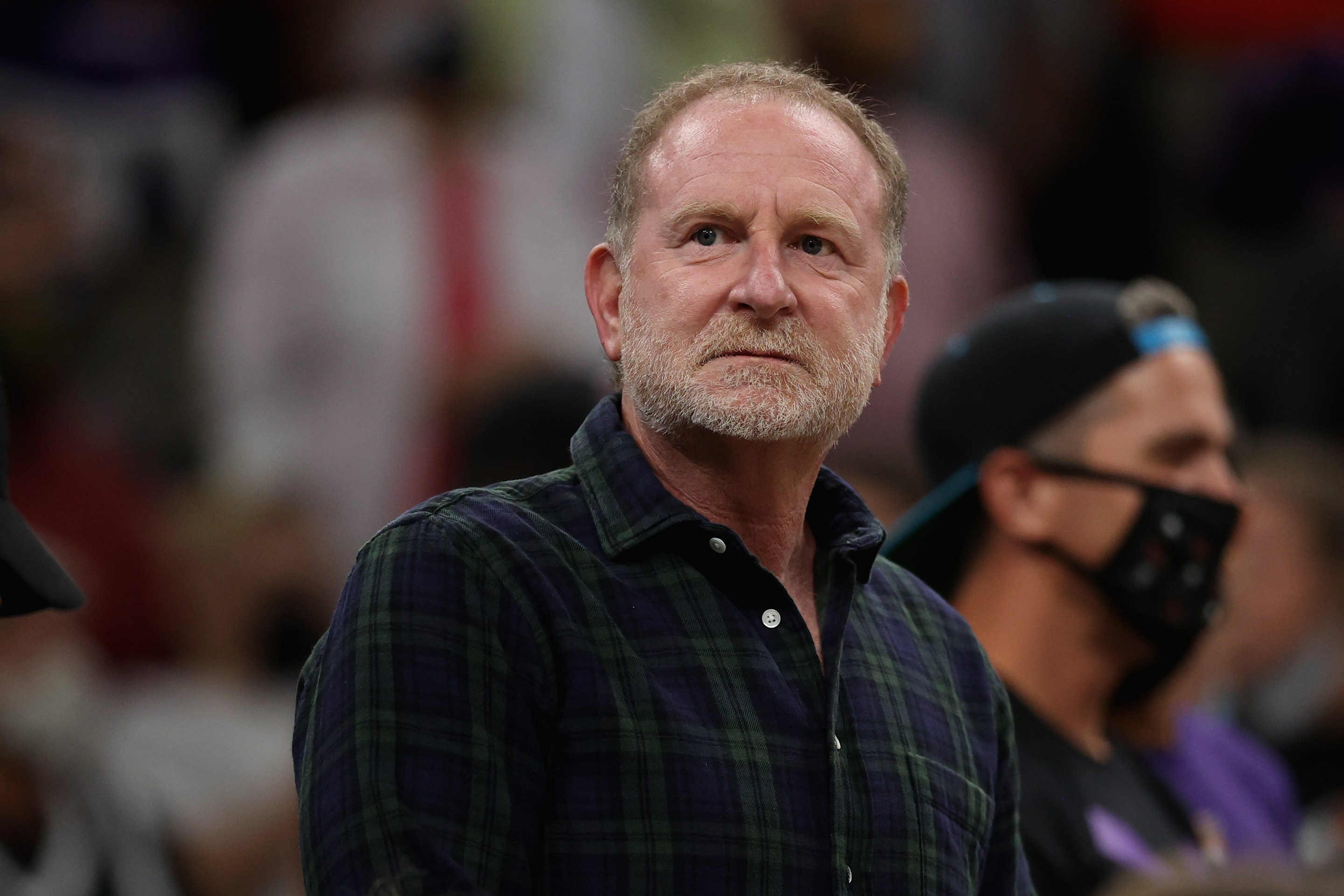Ten months after ESPN first published an investigation into Robert Sarver and his dreadful workplace conduct, the NBA announced today that it has suspended the Phoenix Suns and Phoenix Mercury owner for one year. The announcement accompanied the findings of an independent investigation commissioned by the NBA after the ESPN story's publication; that full report, prepared by the law firm Wachtell, Lipton, Rosen & Katz, can be read here. Under the terms of his suspension, Sarver is prohibited from visiting any NBA or WNBA facility, from representing either team in any capacity, and from involvement in either league's governance. He has also been fined $10 million, the maximum allowed by NBA bylaws. Sarver will be required to complete a workplace conduct "training program."
The report confirms the gist of the Baxter Holmes ESPN story: that in his 18-year tenure as owner, Sarver has fostered a workplace characterized by sexual harassment, bullying, and his practically pathological use of the n-word. The investigation found that Sarver used the word when quoting others no fewer than five times between 2004 and 2017, despite repeated pleas not to from Suns employees. The report describes three confrontations between Sarver and black coaches, all of whom understood these confrontations to have a "racial dimension." In one 2016 meeting, Sarver asked the coach about organizational changes that needed to be made:
The coach responded, “diversity,” and Sarver “erupt[ed],” saying, “No, no, no, I hate diversity.” As the coach became agitated and started to stand up, the witness put his hand on the coach to keep him seated and then said, “Robert, you don’t really hate diversity,” and Sarver responded, “I do.” Sarver then explained that “if you have diversity, people don’t agree.” Both the coach and the witness understood the exchange to be about racial diversity.
Women who worked for Sarver experienced "inequitable and demeaning" treatment. Sarver tried to remove a pregnant employee from an assignment coordinating an event because he thought she would be breastfeeding and needed to be with her child. He also yelled a lot. Employees recalled unwarranted blowups, Sarver "reacting harshly" to things as trivial as the scent of a candle at an event or footage displayed on the jumbotron. The report includes a rather sitcom-style transition between a section describing Sarver yelling at one woman until she cried and another describing a lunch Sarver organized afterward to solve the problem of female Suns employees crying so much. The lunch, nominally a networking session between women who worked for the Suns and women who worked for the bank he owned, was "intended to enable the female bank employees to explain to the female Suns employees how to handle Sarver’s demands."
The harassment was not reserved exclusively for women. Sarver said vulgar things in all-employee meetings and Suns players heard "crude comments about the size of [their] genitalia and their sexual appetites." One of the investigation's central findings is also that Sarver "engaged in workplace-inappropriate physical conduct toward male employees."
Much of the harassment and bullying described in the report features Sarver as perpetrator, but not all of it. Just as the ESPN story did, a later section of the report focuses on the organization's broader workplace culture. It's the usual, all-too-common stuff: "one male executive made unwanted advances toward a female executive; another gossiped about the sex life of one of his female subordinates; and certain male executives exchanged comments orally and by email that objectified women and spoke of them in denigrating terms." The authors of the report wouldn't go so far as to draw a direct line from Sarver to these other incidents, but several employees interviewed during the investigation insisted that Sarver's behavior had a "trickle-down effect," in which those mistreated by Sarver felt emboldened to mistreat their own direct reports in turn.
Interestingly, the report "makes no finding that Mr. Sarver’s workplace misconduct was motivated by racial or gender-based animus." The report says this in light of witness accounts describing Sarver as impulsive and ignorant, just a guy with "sophomoric" sense of humor and no filter. But it's hard to square the idiot joker who didn't know any better explanation with, say, Sarver being told not to use the n-word as early as 2004, and continuing to use it several times between then and 2017. Maybe the report's authors thought Sarver was an equal-opportunity harasser, motivated by general animus rather than any specific strain of hatred. There are all kinds of words for this type of person in the language, but none of them are the kind that get used in the reports that fancy law firms write at the behest of pro sports leagues. None of those words are especially exonerative, either.
The Sarver family and the Suns organization have made several doomed attempts at damage control; between the initial article's reporting and the near-yearlong investigation, they've had a lot of time to formulate a plan. You might remember the weird statement the Suns issued weeks before the ESPN story even came out, which warned of impending "baseless claims against the Suns organization concerning a variety of topics." A few weeks later, Sarver's wife, Penny, messaged former Sarver employees with not-so-veiled threats: "Please put your hatred aside and realize the hurt you are causing by spreading lies and fabrications," one of those messages read. "Is your time in the spotlight that important? If something happens to one of my children, I will hold you and Earl Watson [the former Suns head coach, mentioned in the ESPN story] personally responsible.”
Robert, for his part, organized his objections in the form of a letter his attorney sent to investigators, listing "examples of life-changing initiatives that Mr. Sarver personally led and dedicated numerous hours of his time to make a difference for underserved populations." Not surprisingly, Sarver cites ownership of a women's basketball team as proof of his personal commitment to gender equity. If only it were so easy.
In a statement, Sarver said he "accept[s] the consequences of the NBA's decision," but ESPN reported that Sarver initially didn't take the "punitive process" of the investigation very well. If other, stronger, levers could be pulled here—well, remember who has to pull them. Casual cruelty and harassment may plague more American workplaces than they don't. Sarver's fellow owners, dim a class of people as they are, might be just aware enough to know that.






